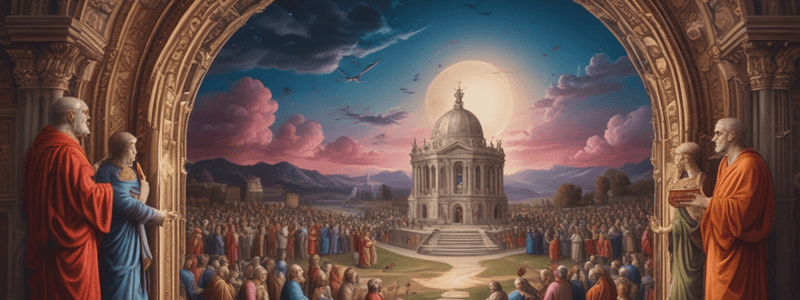Podcast
Questions and Answers
According to the passage, what is Kant's main criticism of the ontological argument?
According to the passage, what is Kant's main criticism of the ontological argument?
- Kant argues that the concept of existence is a predicate that can be added or removed from a concept. (correct)
- Kant argues that the ontological argument is invalid because it relies on logical reasoning alone without empirical evidence.
- Kant argues that the ontological argument confuses the definition of a perfect being with its actual existence.
- Kant argues that an ideal island cannot be proven to exist just because it can be thought of.
How does the passage describe Gaunilo's criticism of the ontological argument?
How does the passage describe Gaunilo's criticism of the ontological argument?
- Gaunilo argued that just because an ideal island cannot be thought of as having better qualities, it does not guarantee its existence. (correct)
- Gaunilo argued that the ontological argument fails because it relies on logical reasoning alone without empirical evidence.
- Gaunilo argued that the ontological argument is flawed because it assumes that God is a perfect being, which is not a valid premise.
- Gaunilo argued that the ontological argument is invalid because it confuses the definition of a perfect being with its actual existence.
What does the passage say about the status of the ontological argument after the criticisms of Gaunilo and Kant?
What does the passage say about the status of the ontological argument after the criticisms of Gaunilo and Kant?
- The passage states that the ontological argument remains a strong and valid proof for the existence of God, despite the criticisms of Gaunilo and Kant.
- The passage states that the ontological argument has been weakened by the criticisms of Gaunilo and Kant, but continues to be explored by philosophers. (correct)
- The passage states that the ontological argument has been completely refuted and abandoned by philosophers.
- The passage does not provide any information about the status of the ontological argument after the criticisms of Gaunilo and Kant.
What is the main point of comparison made between the existence of an ideal island and the existence of God, according to the passage?
What is the main point of comparison made between the existence of an ideal island and the existence of God, according to the passage?
What is the primary purpose of the passage?
What is the primary purpose of the passage?
What is the primary aim of the ontological argument?
What is the primary aim of the ontological argument?
According to the ontological argument, what is the key premise regarding the definition of God?
According to the ontological argument, what is the key premise regarding the definition of God?
What was Gaunilo's main criticism of the ontological argument?
What was Gaunilo's main criticism of the ontological argument?
What was Immanuel Kant's main criticism of the ontological argument?
What was Immanuel Kant's main criticism of the ontological argument?
Flashcards are hidden until you start studying
Study Notes
Ontological Argument: An Argument for God's Existence
The ontological argument, originally put forward by St. Anselm of Canterbury in the 11th century, is a philosophical argument aimed at proving the existence of God based purely on conceptual analysis. The argument relies on the premise that the definition of God includes the concept of perfection, and it is unthinkable that something than which nothing greater can be conceived would not exist. This argument has been subject to numerous criticisms over the centuries, with Gaunilo and Immanuel Kant being notable critics.
St. Anselm's Original Argument
In his book "Proslogion," St. Anselm presented two versions of the ontological argument. The first version questioned whether God exists in reality or just in thought. He argued that if God existed only in thought, it would be possible to conceive of a God who exists in reality as well, making the current concept of God less than perfect. Since it is impossible to think of anything greater than a being whose attributes include existence, God must exist in reality as well as in thought.
Gaunilo's Critique
Gaunilo, a monk critical of the ontological argument, introduced a response known as the "Island Argument." He argued that although it is impossible to conceive of a greater island than an ideal island, it does not necessarily imply that such an island actually exists somewhere in reality. Just because an ideal island cannot be thought of as having better qualities does not guarantee its existence. Similarly, just because God is defined as a perfect being, it does not automatically lead to His existence.
Kant's Criticism
Immanuel Kant, another philosopher, critiqued the ontological argument in his work "Critique of Pure Reason". He argued that the concept of existence is not a predicate but rather a mode of thinking. Existence is not an inherent quality of objects or beings, and the concept of existence itself cannot be added to or removed from the essence of a thing. Therefore, the ontological argument fails because it confuses existence with a predicate that can be attached or detached from a concept.
Despite these criticisms, many arguments continue to explore variations of the ontological argument, aiming to refute these criticisms and provide a stronger foundation for the existence of God.
Studying That Suits You
Use AI to generate personalized quizzes and flashcards to suit your learning preferences.




